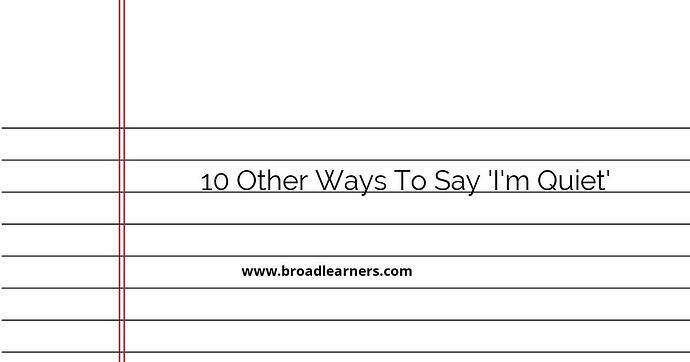Are you looking for different ways to say 'I'm quiet'? While 'I'm quiet' is a simple and straightforward statement, there are several alternative phrases you can use to convey the same meaning. Here are 10 other ways to express your quietness:
- I'm reserved
- I'm introverted
- I'm shy
- I'm a person of few words
- I prefer to listen rather than speak
- I'm a good listener
- I'm reflective
- I'm contemplative
- I'm observant
- I'm deep in thought
Each of these phrases conveys a slightly different nuance of being quiet or reserved. Let's explore each one in more detail:
1. I'm Reserved
When you say 'I'm reserved,' it means that you tend to be quiet and keep to yourself. You may not be comfortable with sharing personal thoughts or feelings openly. Being reserved can also indicate a sense of caution or self-restraint in social situations.
Example:
When I'm in a new environment, I tend to be reserved and observe before opening up to others.
2. I'm Introverted
If you describe yourself as introverted, it means that you gain energy from spending time alone and may find social interactions draining. Introverts tend to prefer solitary activities and may feel more comfortable in quieter, less stimulating environments.
Example:
I recharge my energy by spending time alone. I'm introverted and enjoy quiet activities like reading and painting.
3. I'm Shy
Being shy means feeling nervous or uncomfortable in social situations, often leading to a reluctance to speak up or engage with others. Shyness can manifest as a fear of judgment or embarrassment and may require more time to feel comfortable around new people.
Example:
I'm shy by nature, so it takes me a while to open up and feel comfortable in group settings.
4. I'm a Person of Few Words
If you say 'I'm a person of few words,' it means you tend to communicate concisely and prefer not to engage in lengthy conversations. You value silence and believe that actions often speak louder than words.
Example:
I may not say much, but I believe that my actions speak volumes. I'm a person of few words.
5. I Prefer to Listen Rather Than Speak
If you prefer to listen rather than speak, it means you enjoy taking in information and hearing others' perspectives more than sharing your own thoughts. You value the power of attentive listening and believe it enriches your understanding of others.
Example:
I find great value in listening to others. I prefer to listen rather than speak because it allows me to learn from different viewpoints.
6. I'm a Good Listener
When you say 'I'm a good listener,' it means you actively pay attention and provide support to others during conversations. You give others the space to express themselves and offer empathy and understanding.
Example:
People often come to me when they need someone to listen. I take pride in being a good listener and offering support to others.
7. I'm Reflective
If you describe yourself as reflective, it means you often spend time thinking deeply about your experiences, emotions, and the world around you. Being reflective allows you to gain insights and make meaning from your thoughts.
Example:
I'm a reflective person who enjoys introspection. I often spend time analyzing my thoughts and reflecting on my actions.
8. I'm Contemplative
Being contemplative means you engage in deep thought or reflection, often pondering philosophical or abstract concepts. Contemplation allows you to explore complex ideas and gain a deeper understanding of yourself and the world.
Example:
I find solace in contemplation. It helps me unravel the complexities of life and gain a broader perspective.
9. I'm Observant
If you're observant, it means you pay close attention to details and notice things that others may overlook. You have a keen eye for observing people's behavior, body language, and the environment around you.
Example:
I'm naturally observant, and I often notice subtle changes in people's moods or the atmosphere of a room.
10. I'm Deep in Thought
If you say 'I'm deep in thought,' it means that you're fully engaged in your own thinking processes and may appear distant or lost in your thoughts. Being deep in thought indicates a state of introspection or contemplation.
Example:
I apologize if I seem distant. I'm deep in thought and reflecting on a problem I'm trying to solve.
These alternative phrases provide a range of ways to express your quiet nature. Choose the phrase that best fits your personality and the context of the conversation. Remember, being quiet is not a weakness but rather a unique trait that can bring depth and insight to your interactions.
Did I miss anything? Respond below
